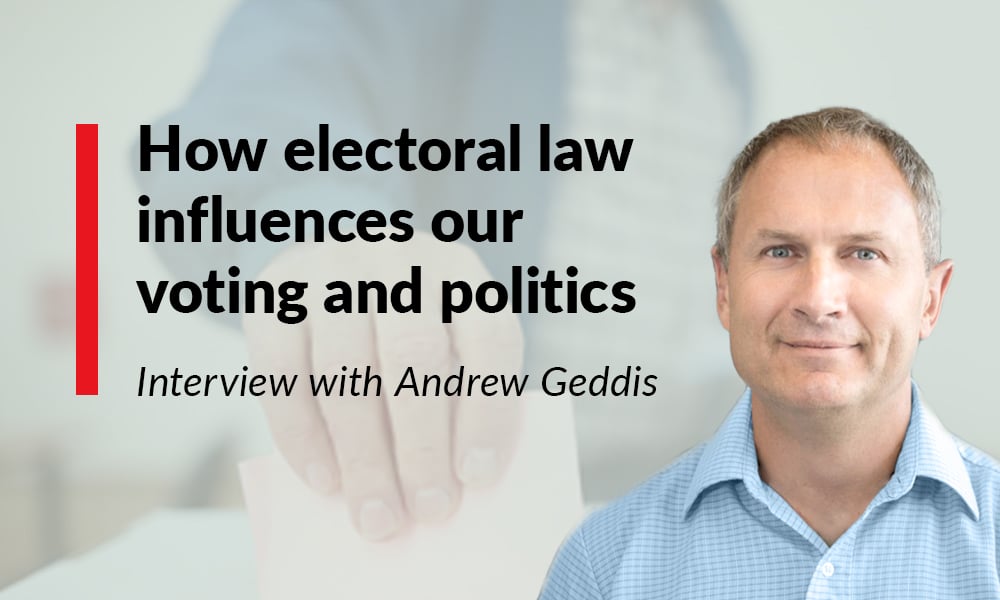
Advertising, party funding, voting age – all of this is governed by electoral law. University of Otago Professor discusses the biggest changes in this space

With only a few months to go until the next General Election, New Zealanders will soon be heading to the voting booths en masse. But while most know about the MMP system, party votes and candidate votes, fewer know about the complex laws and regulations that underpin the way we all experience voting and politics.
For the average person, taking part in an election is no more than putting a slip of paper into a ballot. But for the legally minded, electoral law is an exciting and constantly changing landscape – and with an Independent Electoral Review initiated in 2022, more change is on the horizon.
One of the specialists on the Review panel appointed by the Government is Andrew Geddis, Professor of the Faculty of Law at the University of Otago. Geddis also recently released the third edition of his book – Electoral Law in Aotearoa New Zealand – which contains his own comprehensive review of our electoral system, written from a legal perspective.
For Geddis, the interaction between law, institutions, collective government and politics has long been an area of interest. He wrote the previous edition of Electoral Law in Aotearoa New Zealand back in 2014, but the law in this area – and our idea of what proper elections should look like – is constantly changing.
“The way we regulate our funding of political parties, and the way in which people can use television and radio to advertise have changed,” Geddis explains. “We’ve also changed the kinds of offences that can be prosecuted during election time – not just Electoral Act offences, but also Crimes Act offences.”
“The kinds of things that people are considering for change has also shifted over that period,” he continues.
“There’s a large debate over whether people should be able to vote at 16 or 18, and there’s a debate over what level of support political parties should have to achieve in order to get into parliament. All of these things are constantly up for discussion, and parliament has moved on many occasions to change the law.”
Geddis notes that the courts have also become more active in the electoral law space, and the last few years have seen several important court decisions emerge.
These include the Watson & Jones case, which related to electoral advertising on television; the Taylor v Attorney-General case with declarations of inconsistency around prisoner voting; and most recently the Make It 16 case, where the Supreme Court granted an appeal which could see the voting age lowered.
With both courts and parliament regularly changing the law as it applies, and the rules that underpin elections, Geddis says that the time was very much ripe for a third edition. Published by LexisNexis, Electoral Law in Aotearoa New Zealand gives a detailed legal explanation of the rules and practices followed at election time – but also explains the assumptions underpinning those roles, why they’ve been chosen, and what outcomes they create.
“The fairness, integrity and transparency of the system dictate the kinds of rules that we choose,” Geddis says.
“So I’ve tried to explain not only the technical, black letter of law, but the reasons why these rules have been chosen.”
“For example, the choice to have an MMP system will almost always produce coalition governments, which then requires political practice in order for that to work,” he explains. “I’ve tried to show why we chose MMP, what the rules around MMP are, what the law says you need in order to get into parliament, and what the result is.”
While there is some debate over MMP and how much influence it gives minority parties, Geddis notes that it’s been an effective way of ensuring that the majority of voters are represented. He says that forming coalitions and striking deals are all part of this by design – though 2020 was an outlier, largely due to COVID-19.
“There’s no perfect voting system, they all have their drawbacks,” he states.
“But because of the historical way our voting systems operated, New Zealanders chose this proportional voting system that required parties to make compromises, because we’d rather have two or more parties doing deals than one big party getting everything at once.”
While Geddis’s book has been written with the legal community and students interested in New Zealand’s politics and institutions in mind, it can also be picked up by politically minded or curious layfolk wanting to know how the system of government works from a legal perspective. It includes chapters on the 2020 election and the impact of COVID-19 on responding to emergencies at election time, changes to Māori and general electoral rolls, and on changes to political funding rules.
“My hope is that a general lay reader could pick this up, and it might help them to see why our law around elections looks the way it does, and how it creates the kind of parliament and politics that we all experience,” Geddis says.
“Electoral law isn’t just an area of technical rules and regulations. It largely shapes how our parliamentary government is created, and the policy decisions behind electoral law influence our entire constitutional order.
“If you want to understand how our elections and the politics they create work, you need to have an understanding of these things as well.”
Electoral Law in Aotearoa New Zealand, 3rd Edition is available for purchase through LexisNexis.